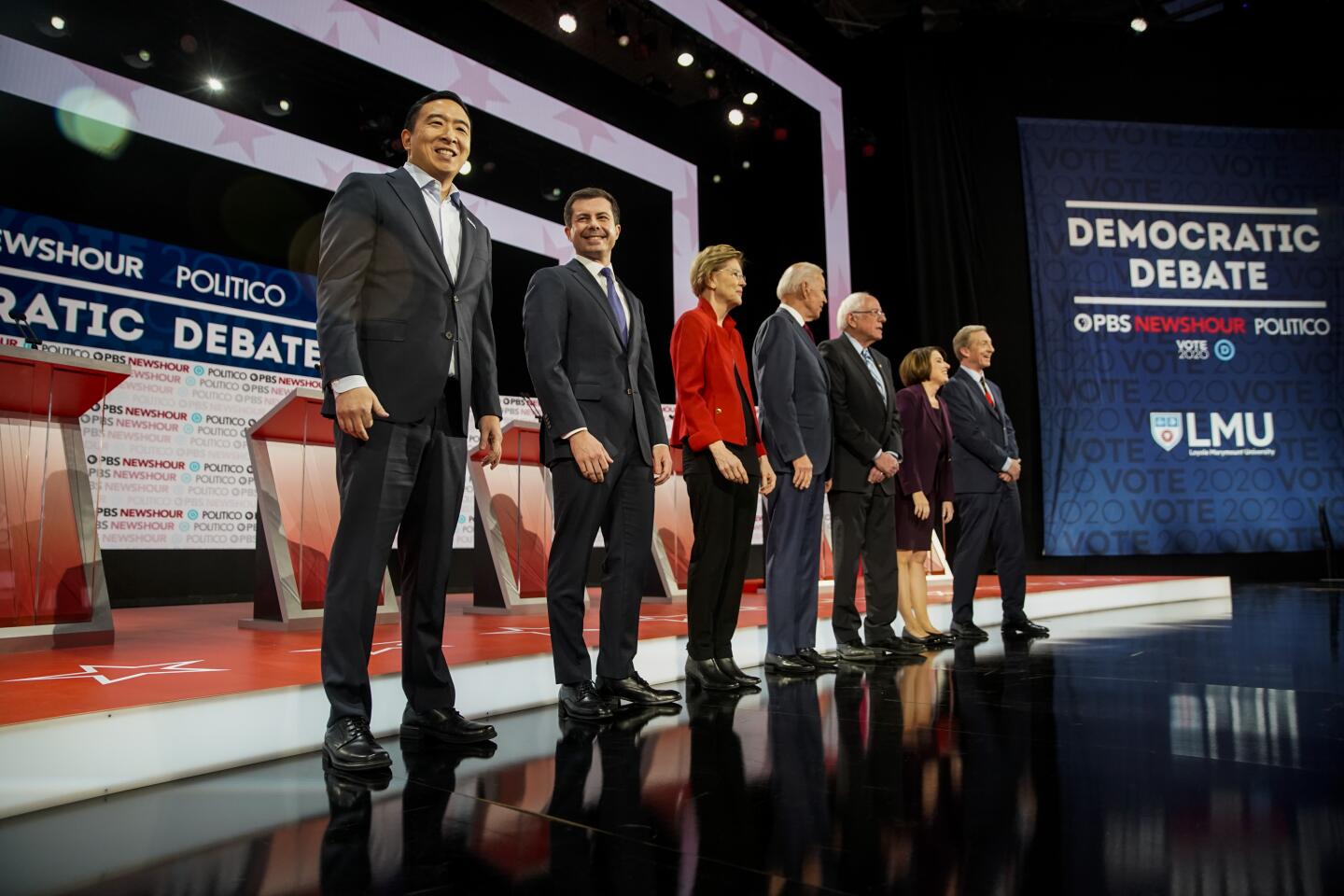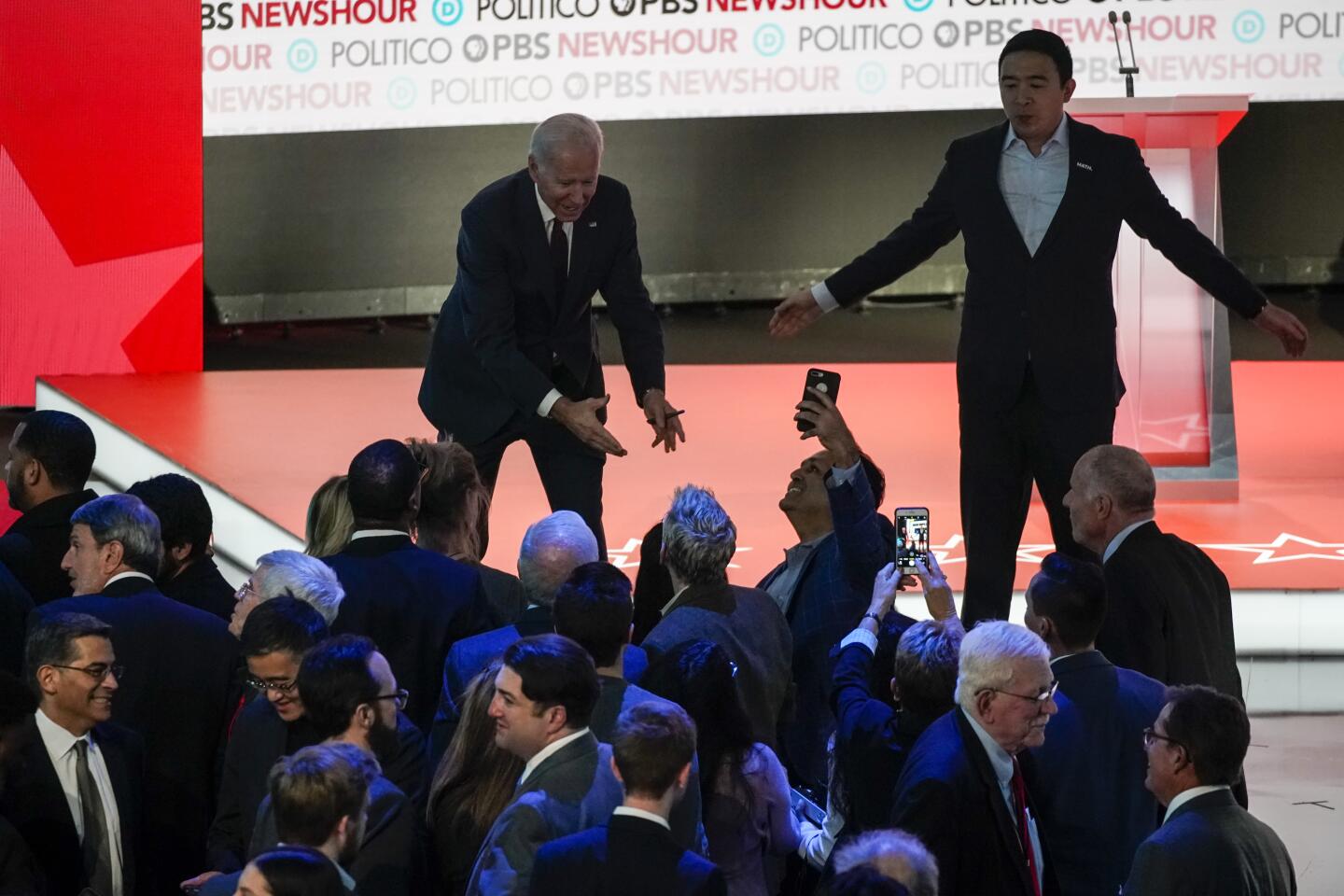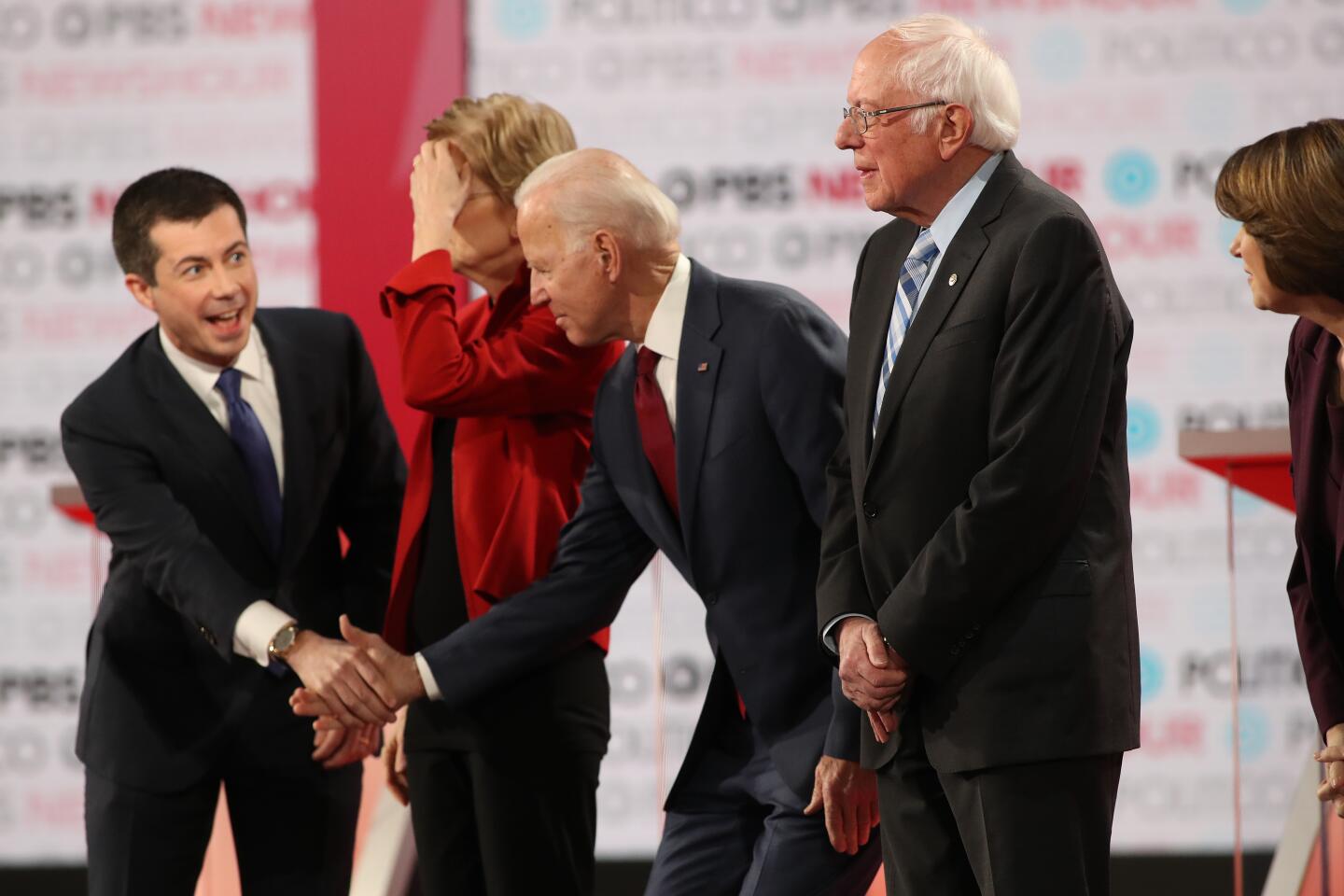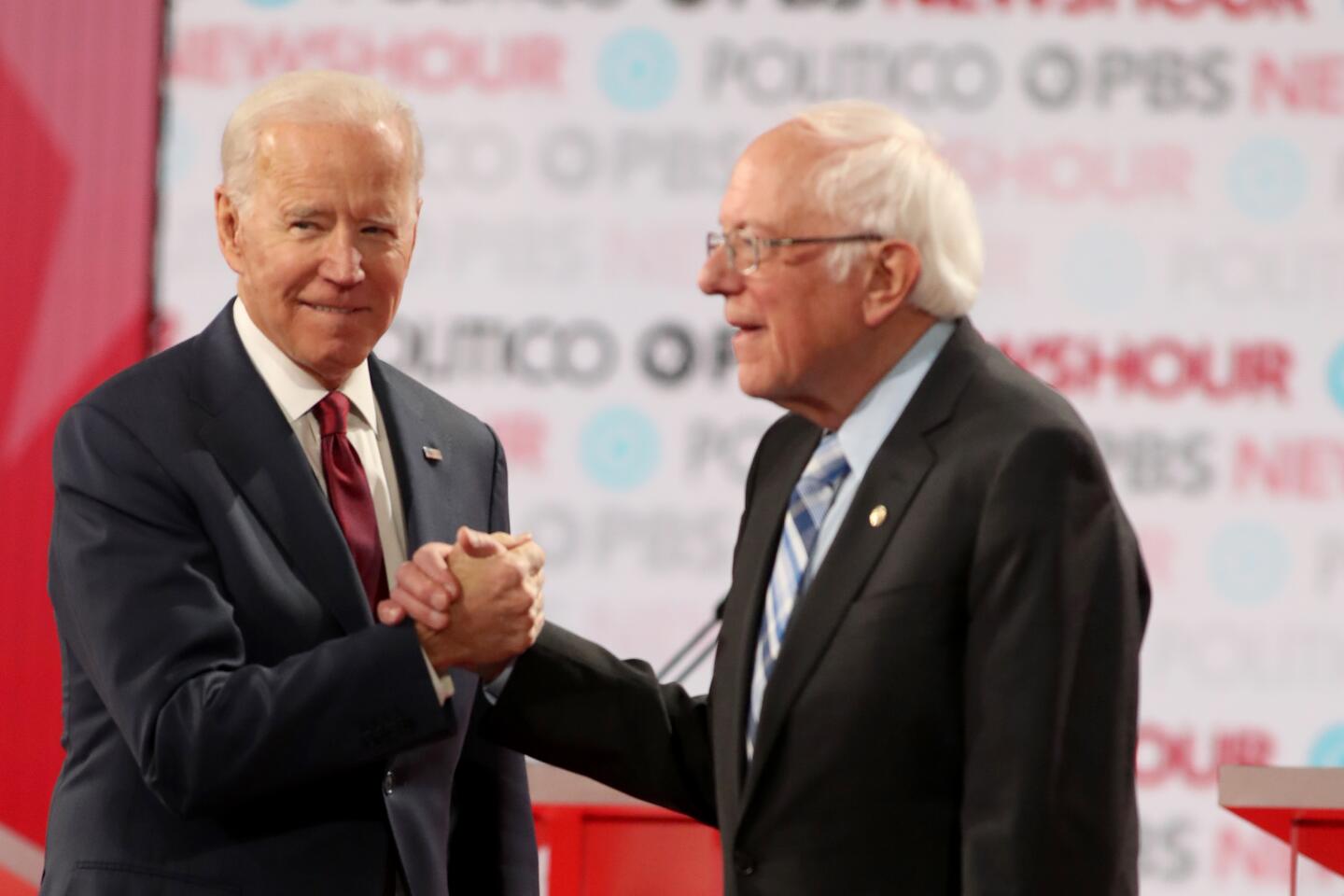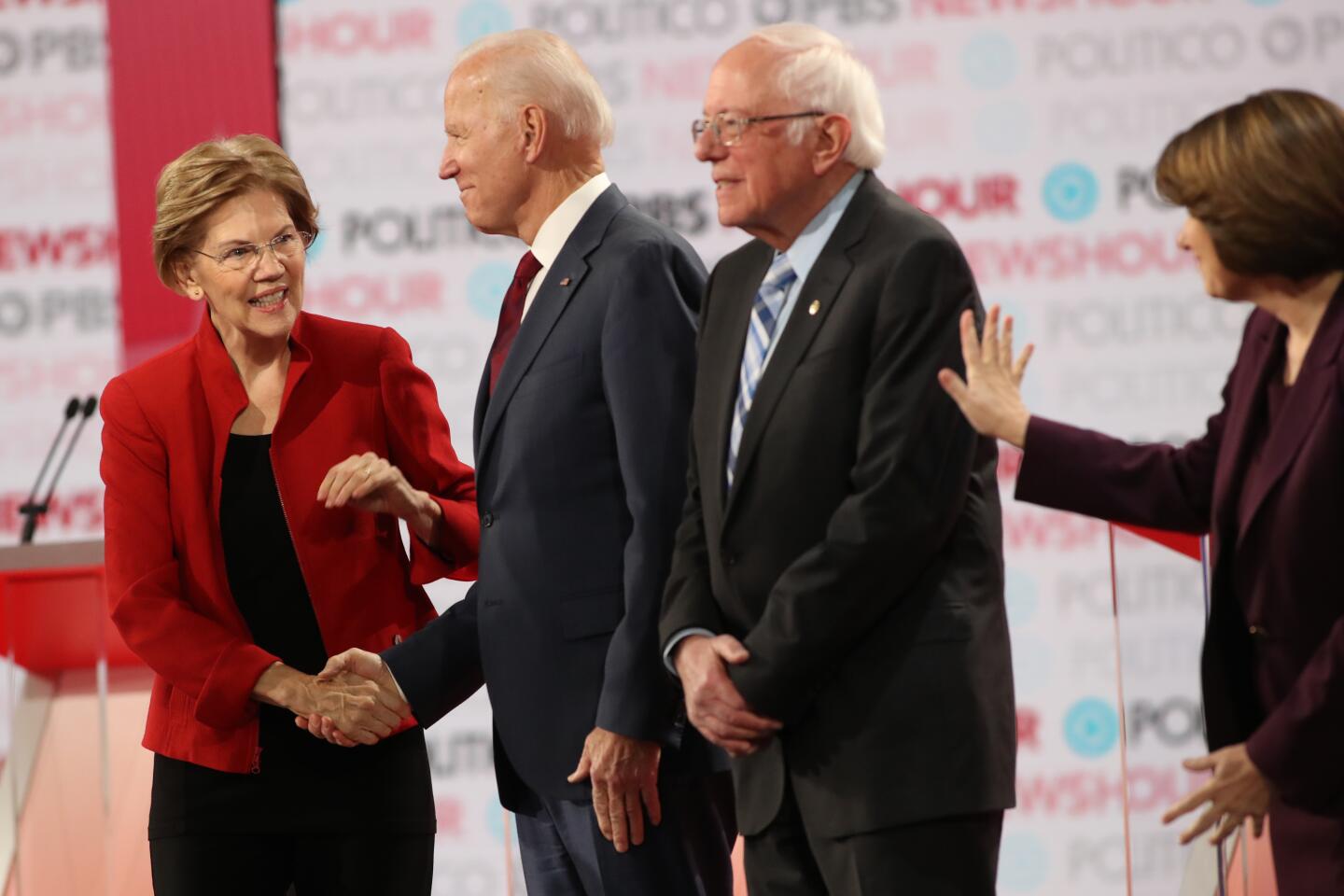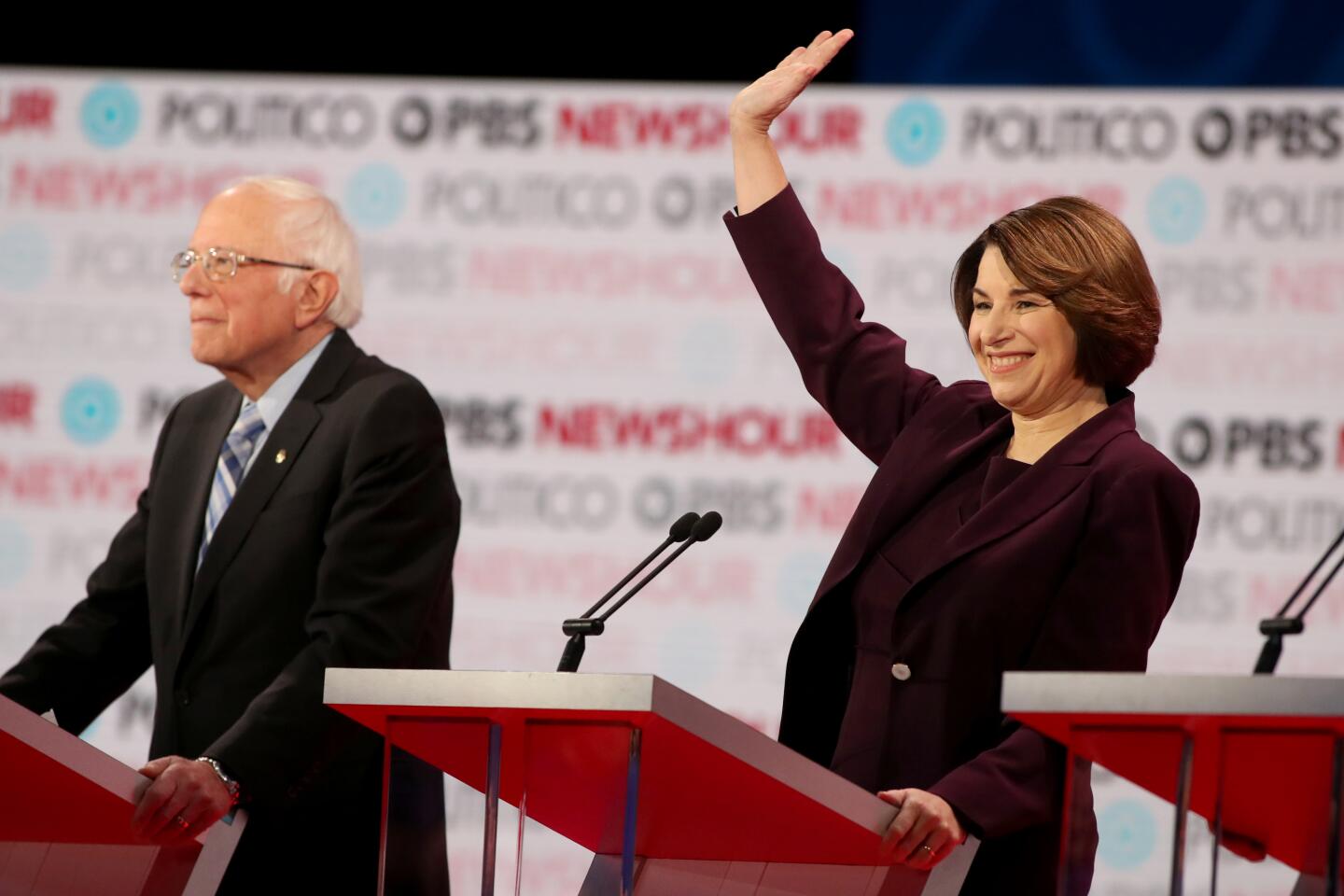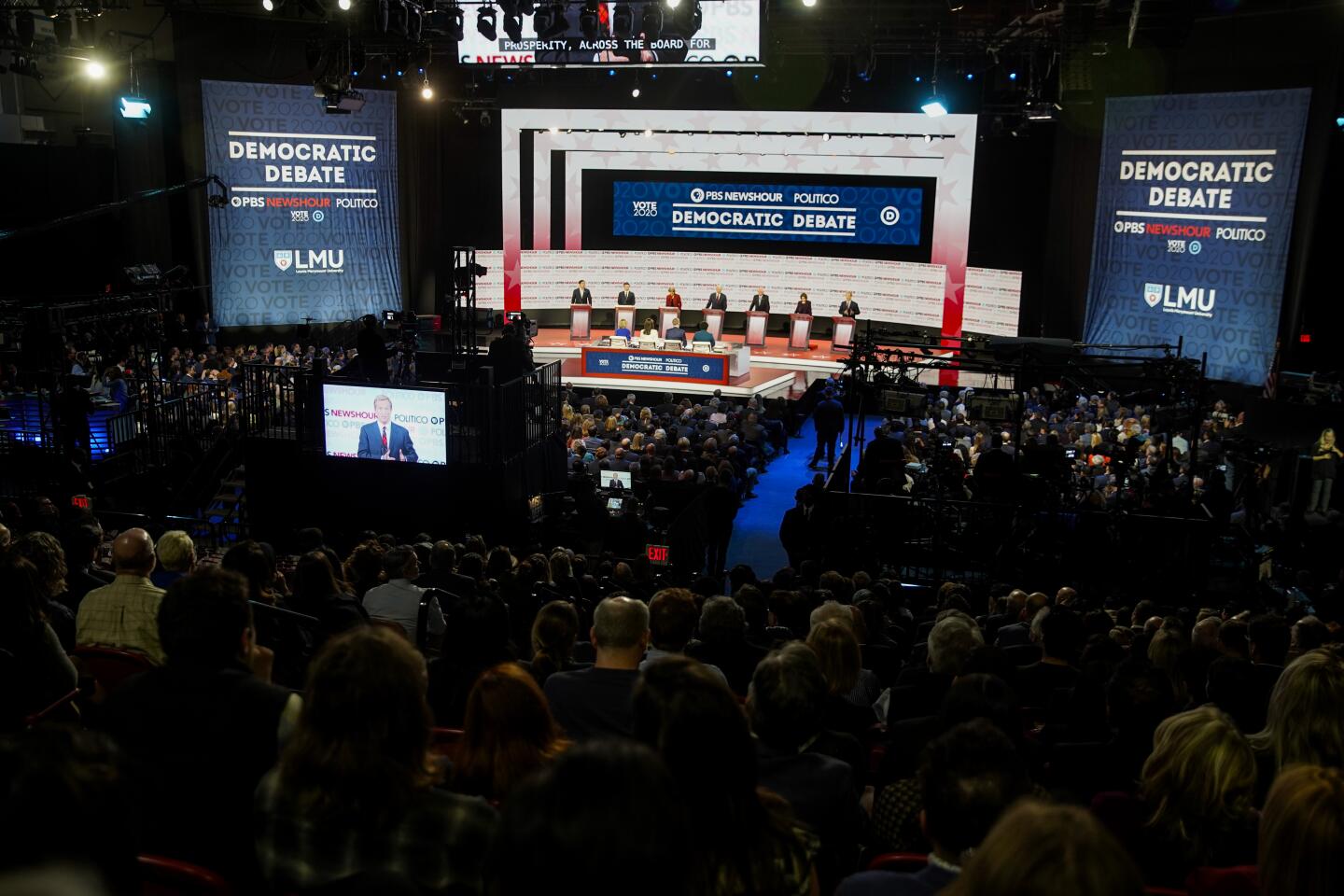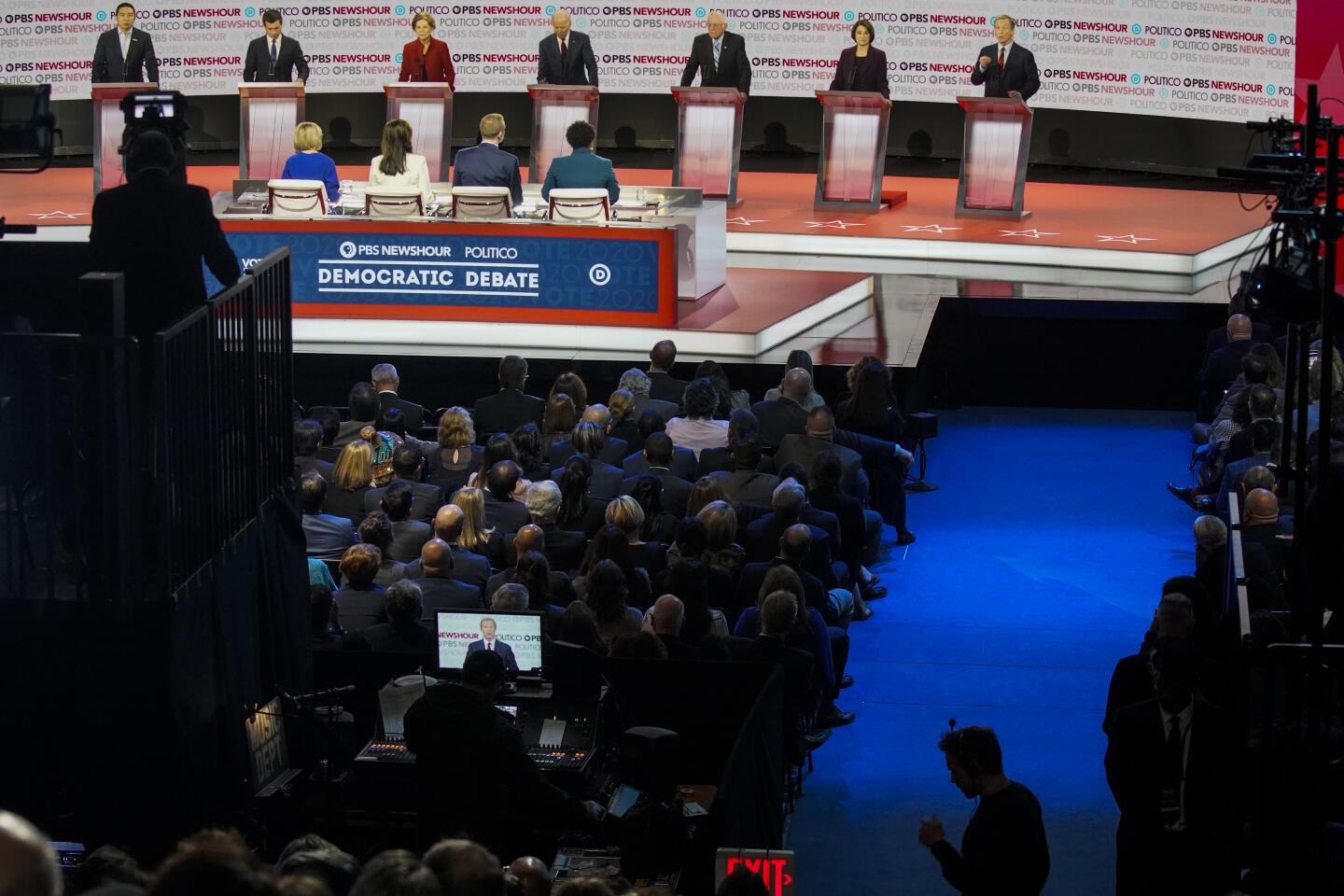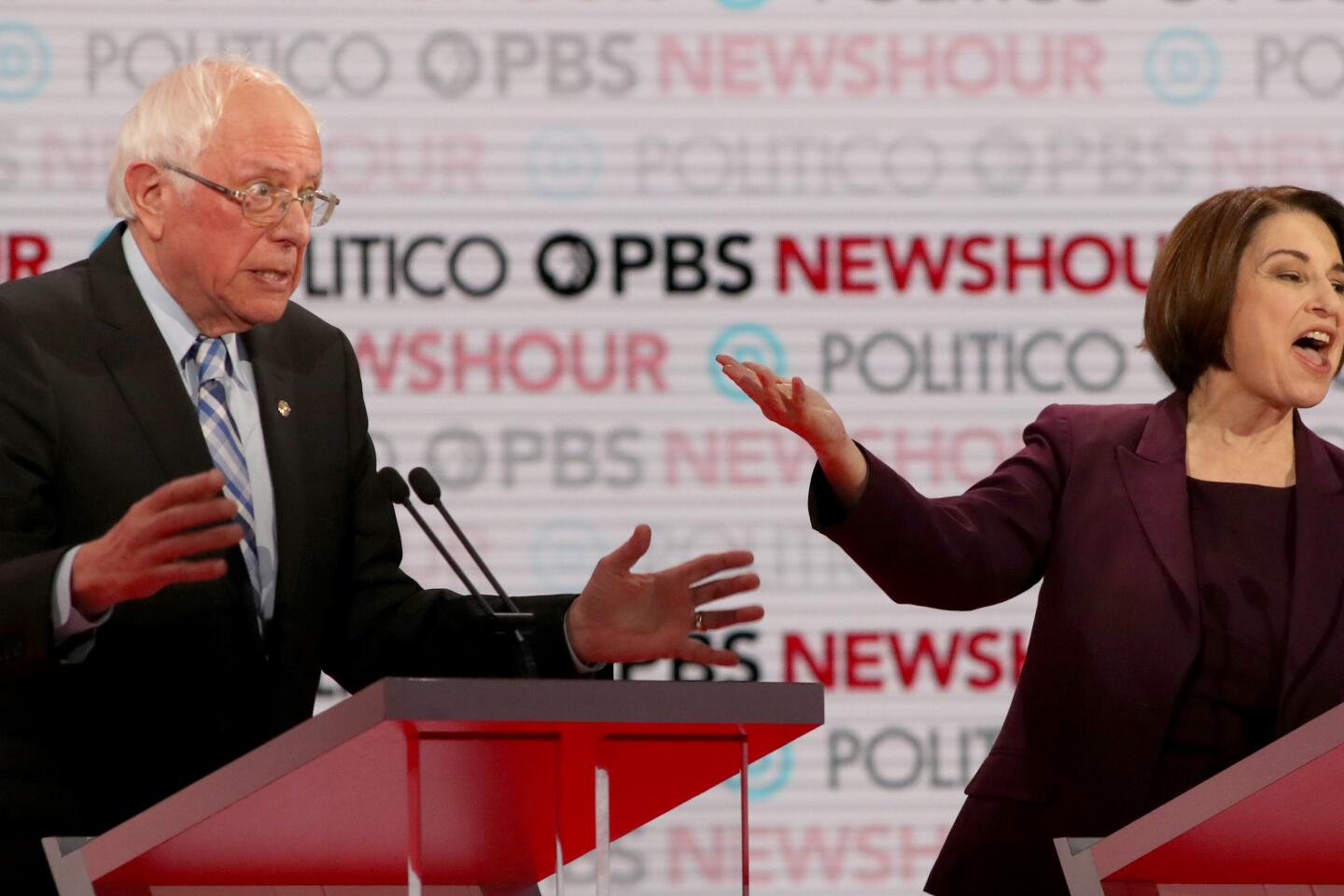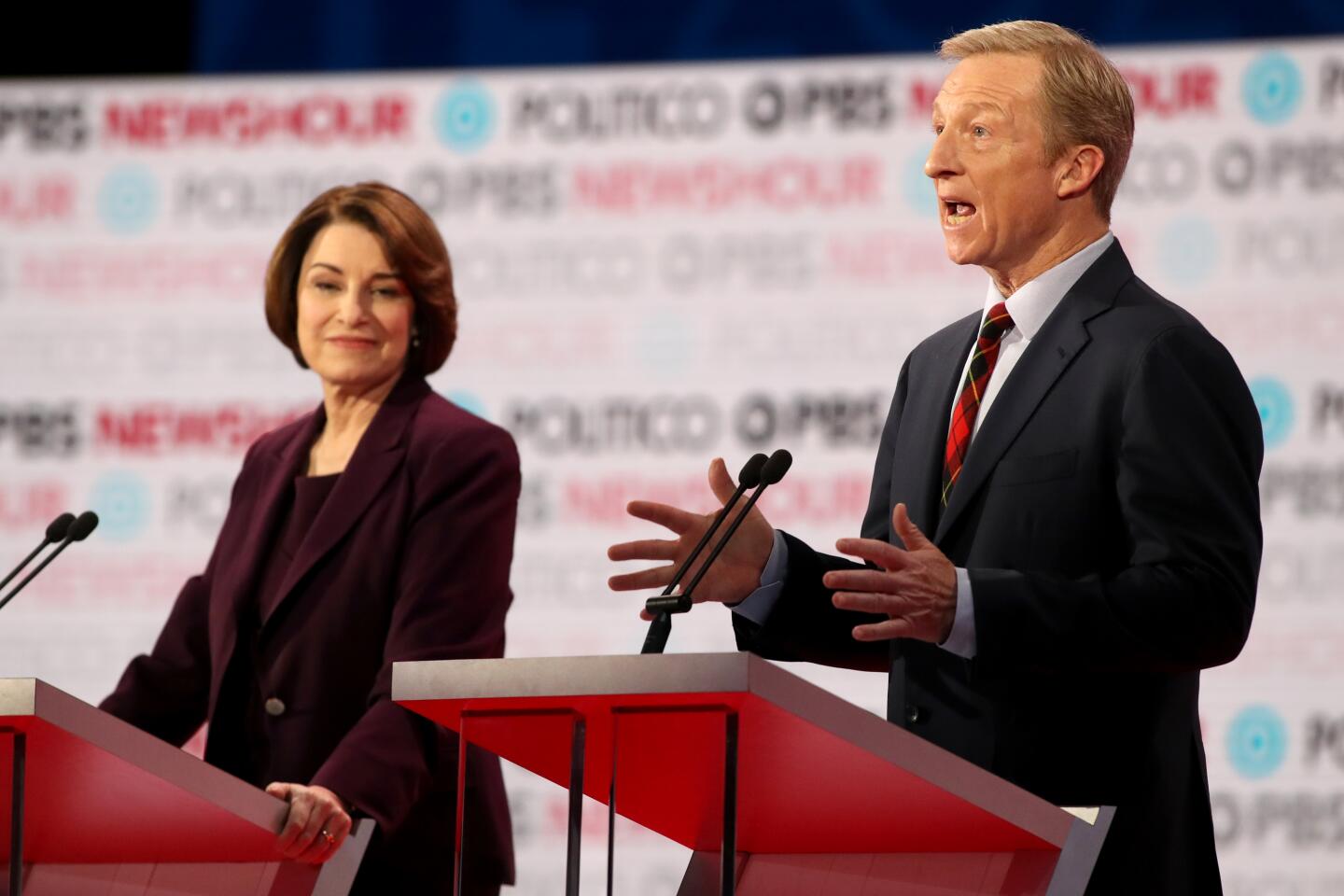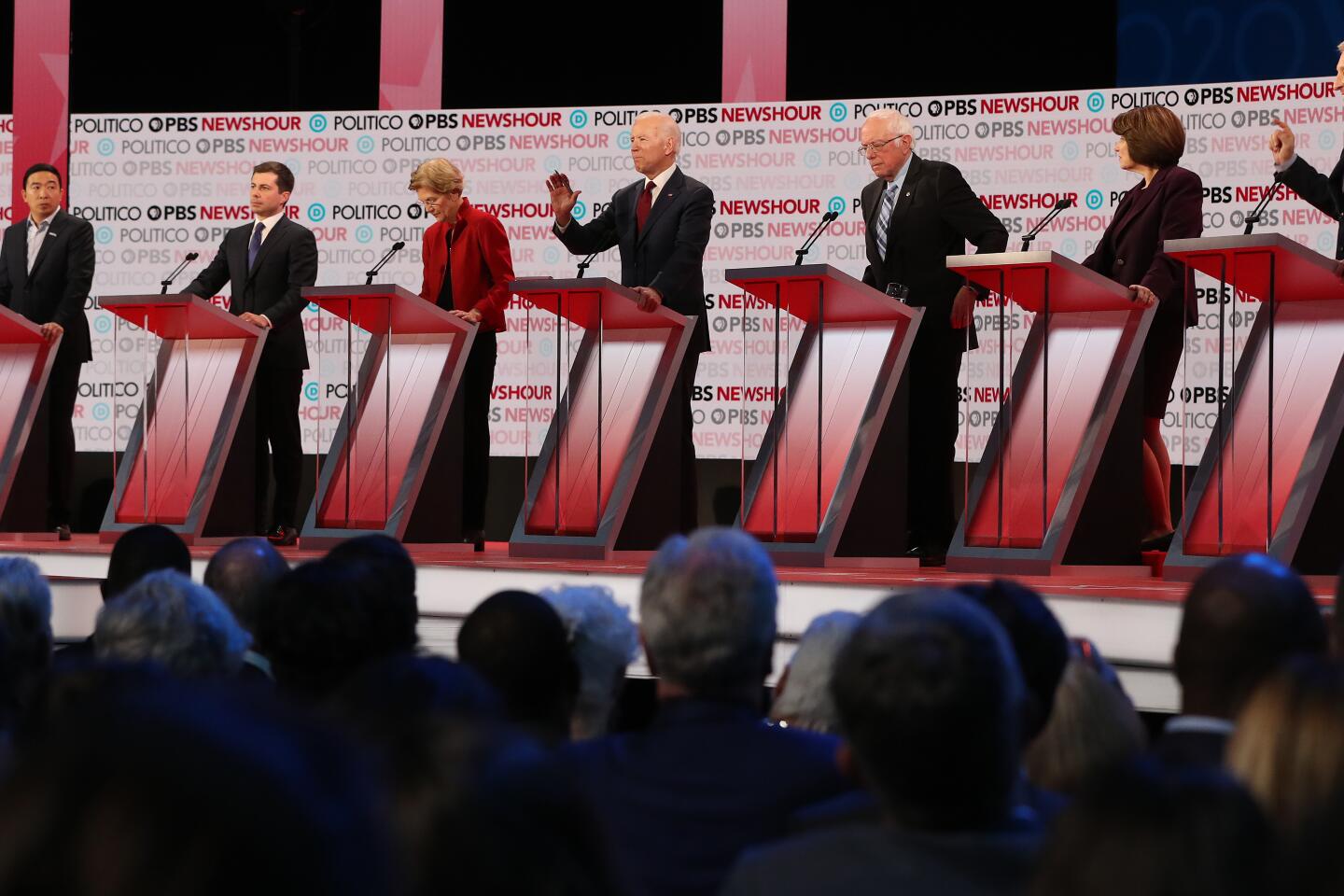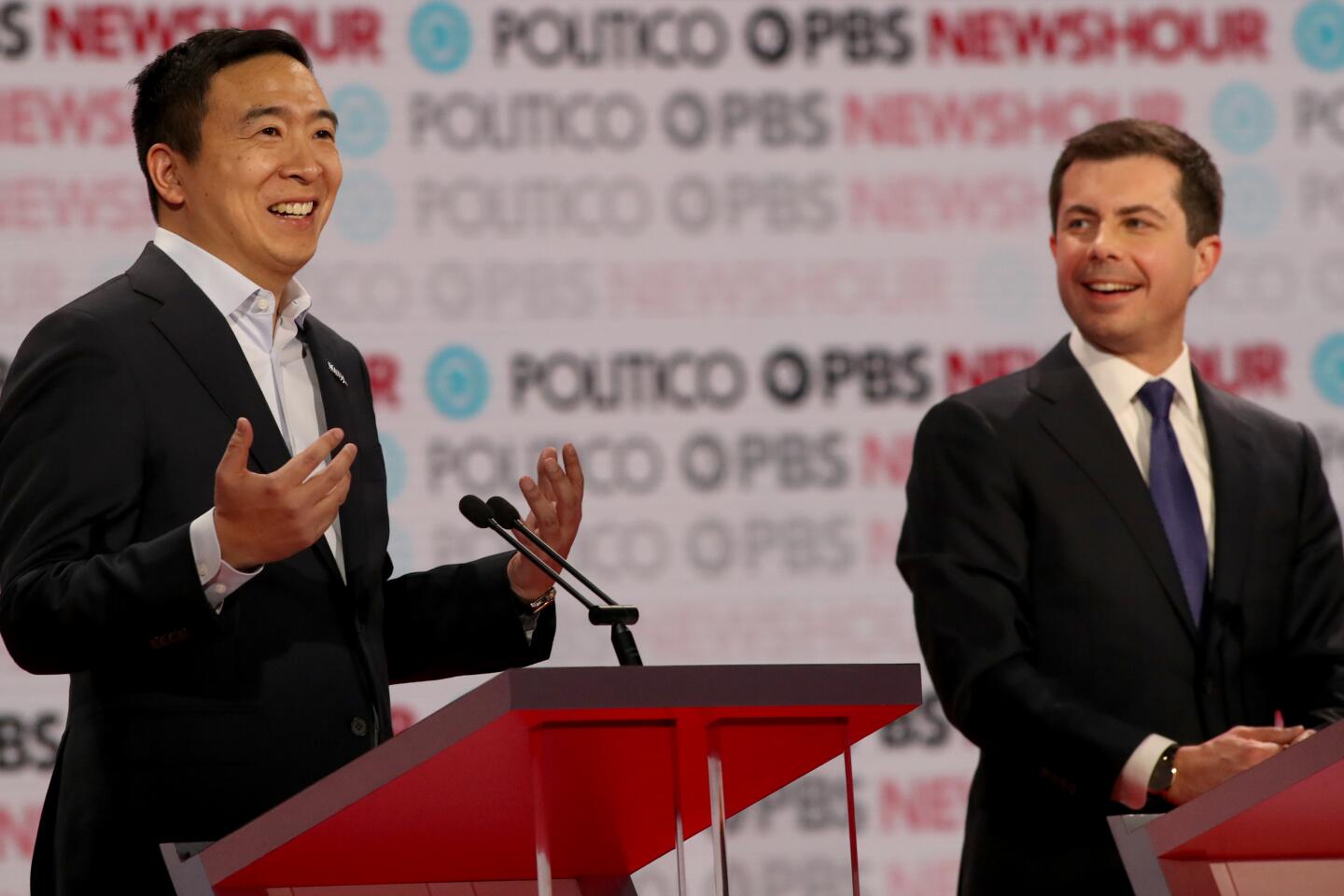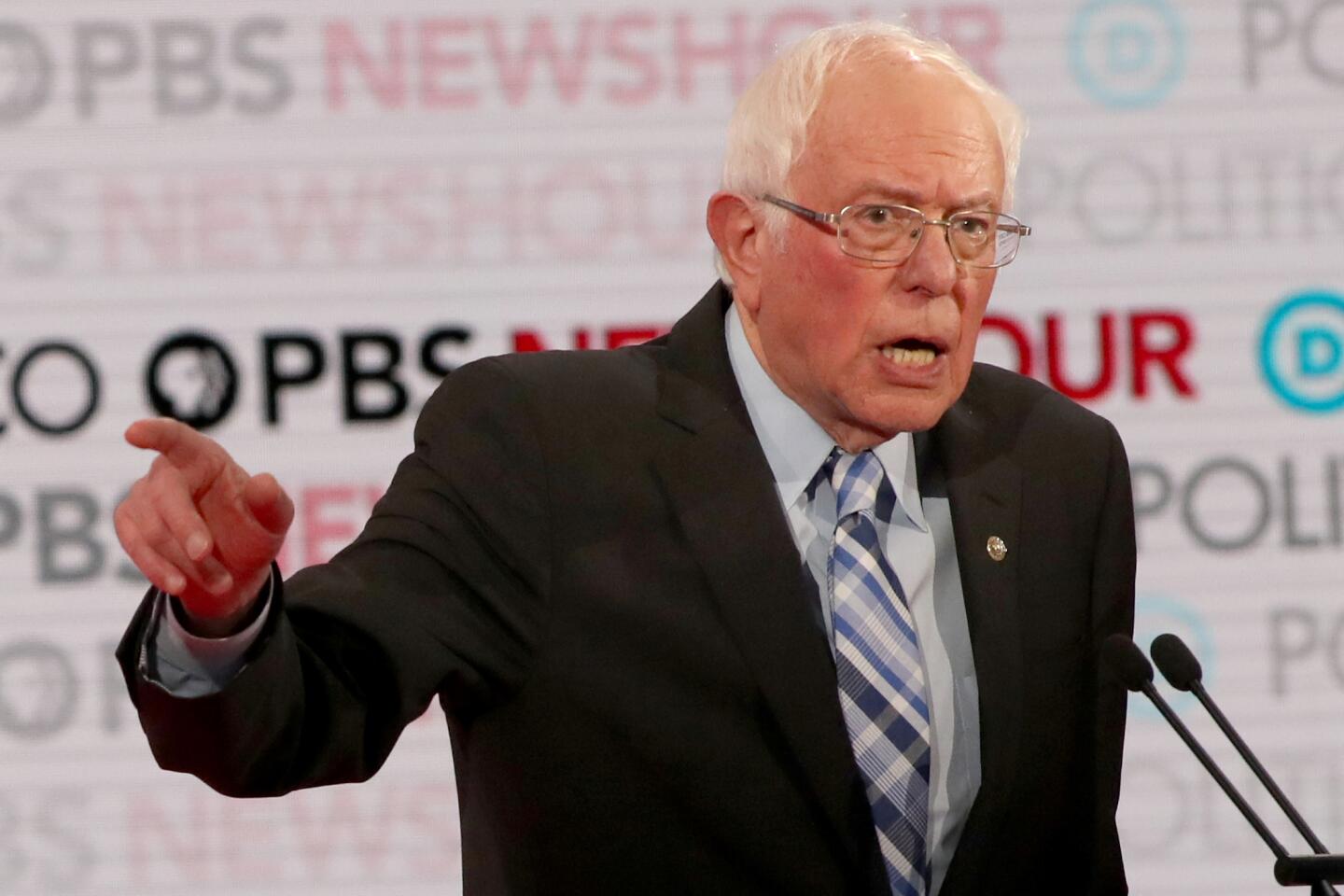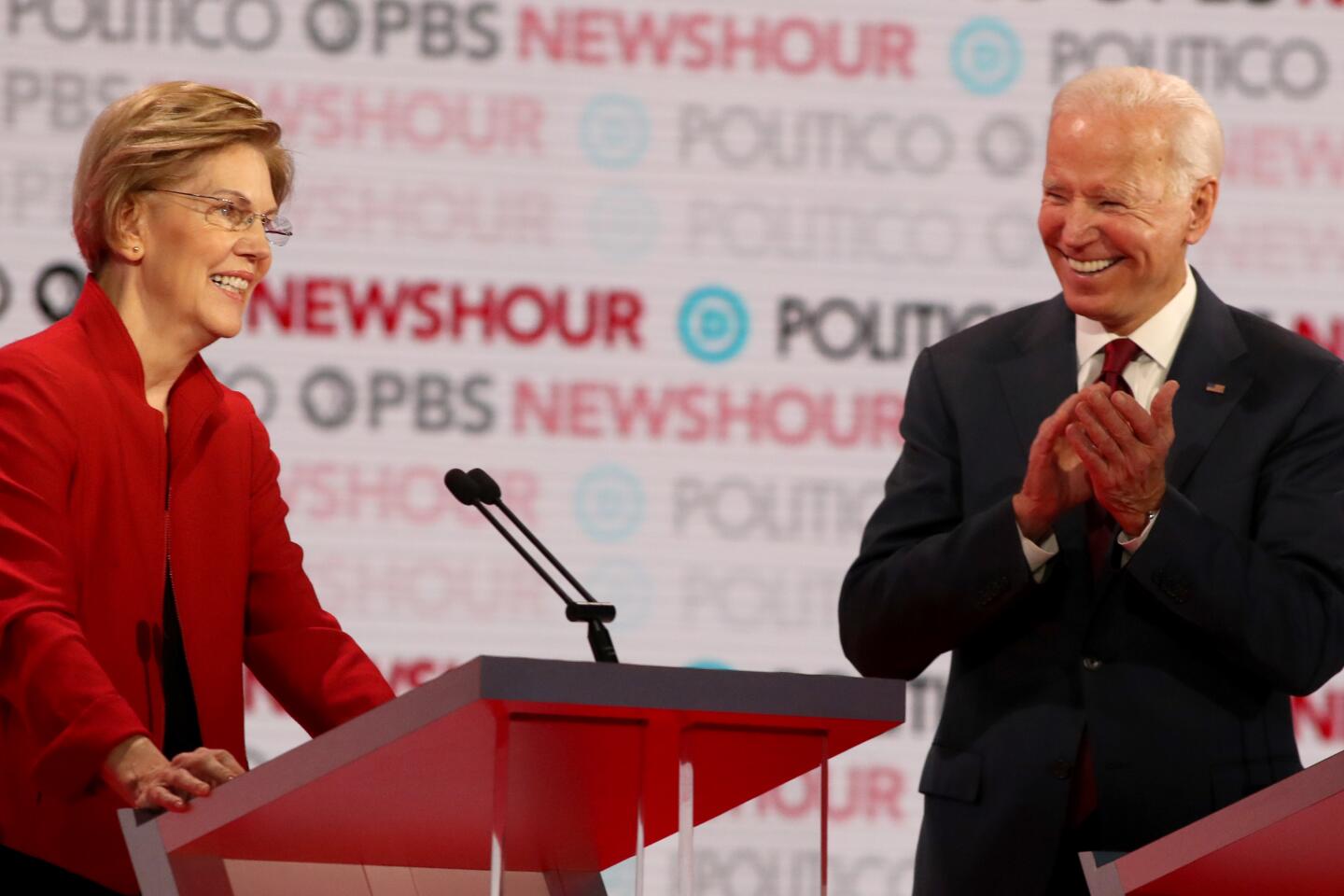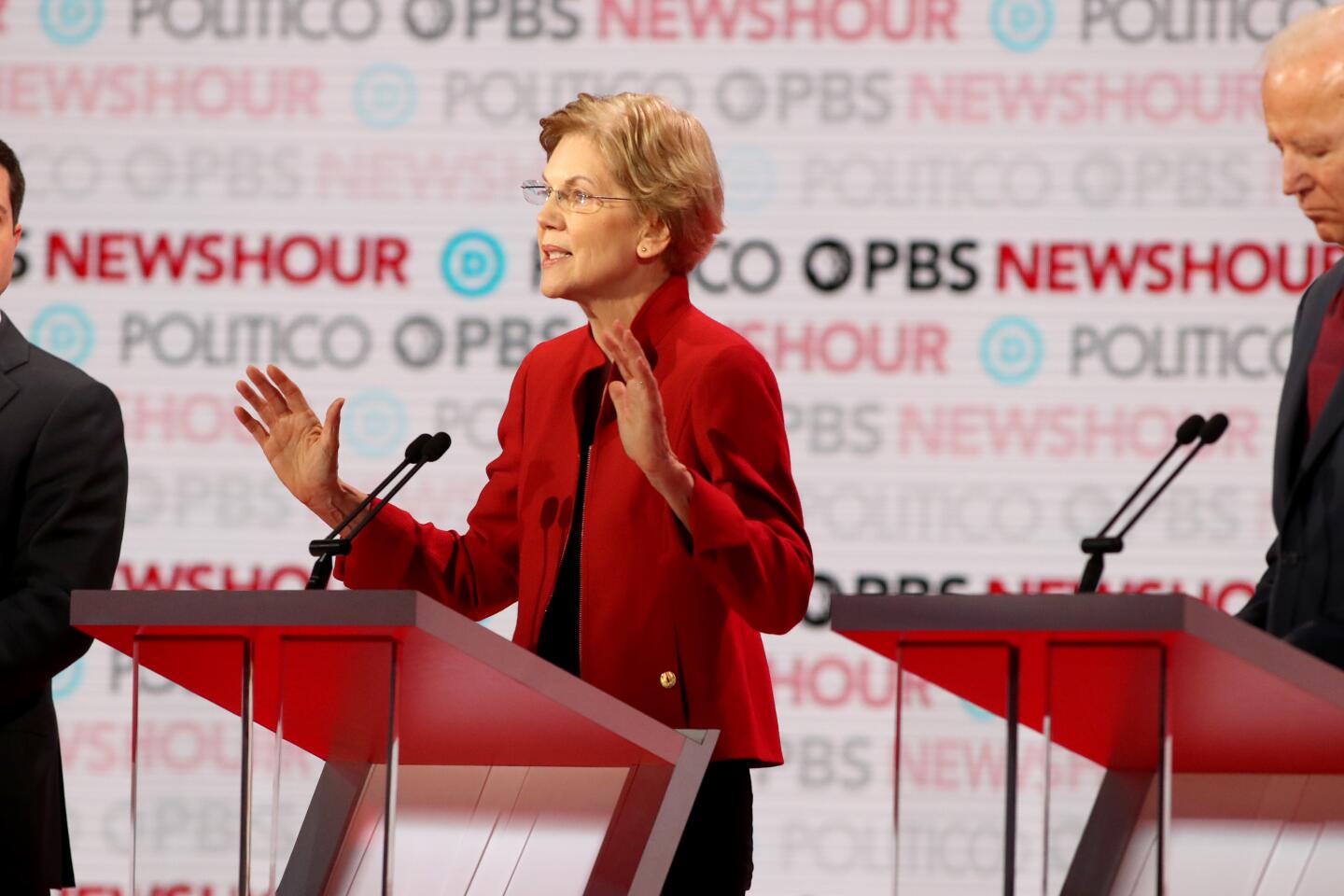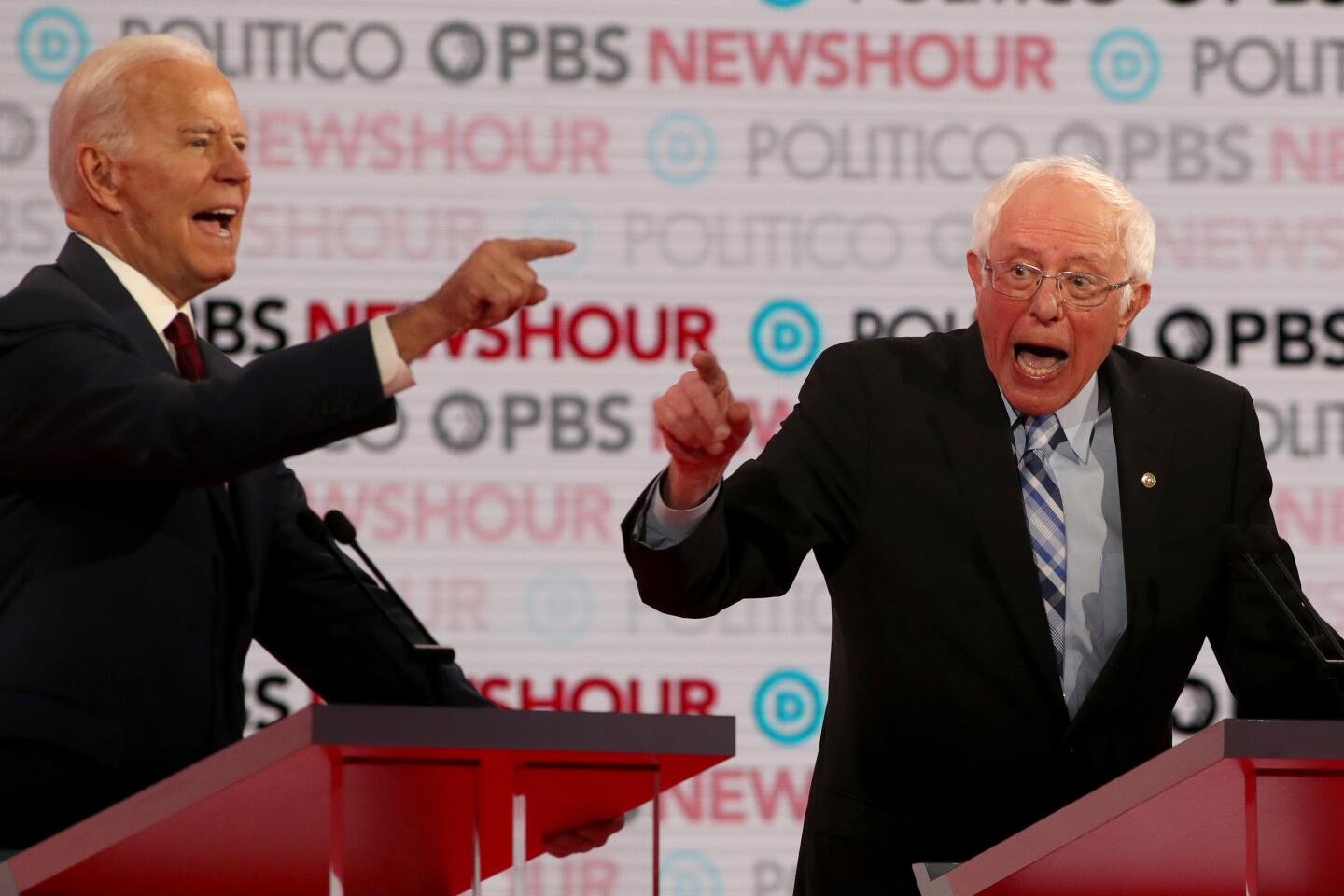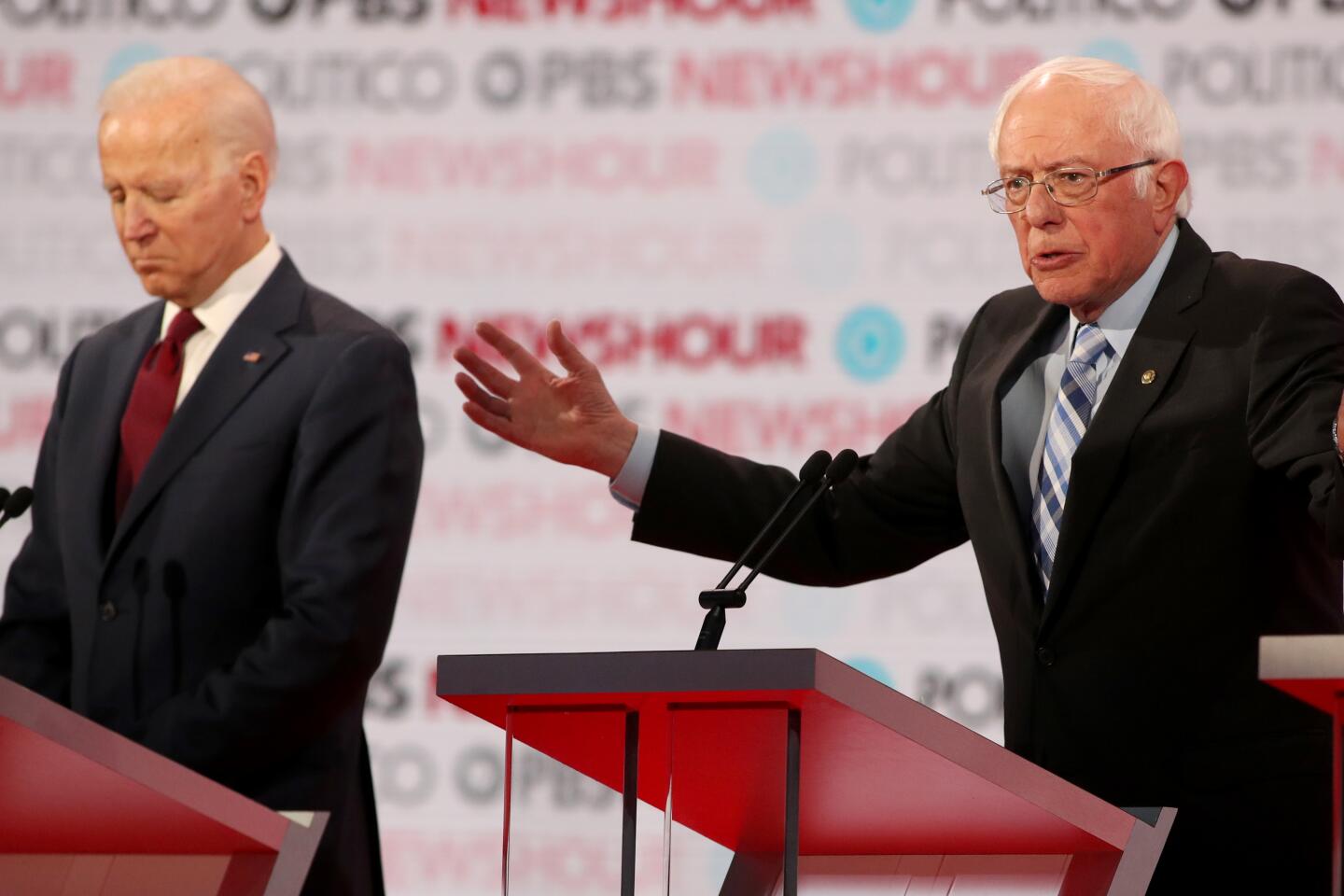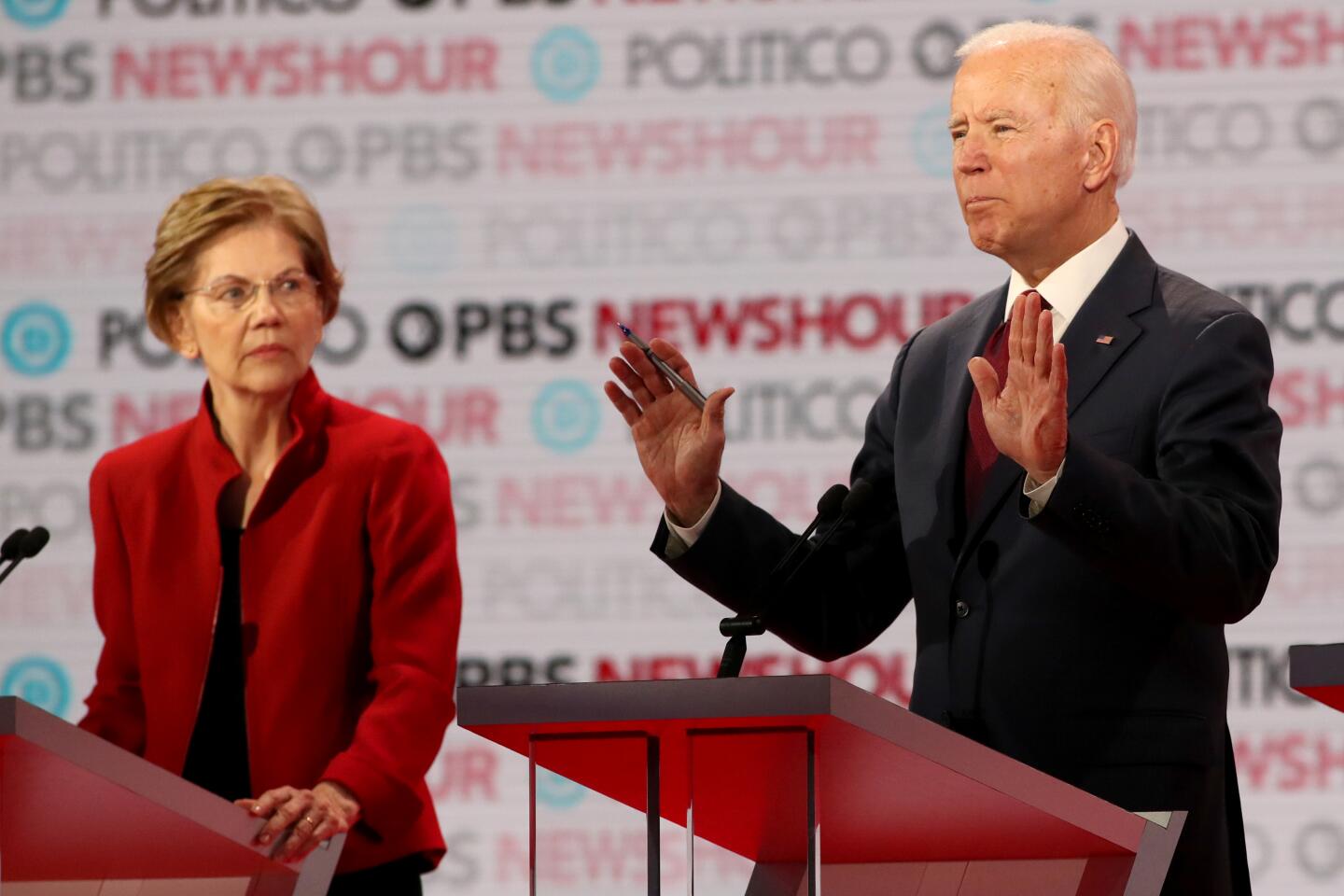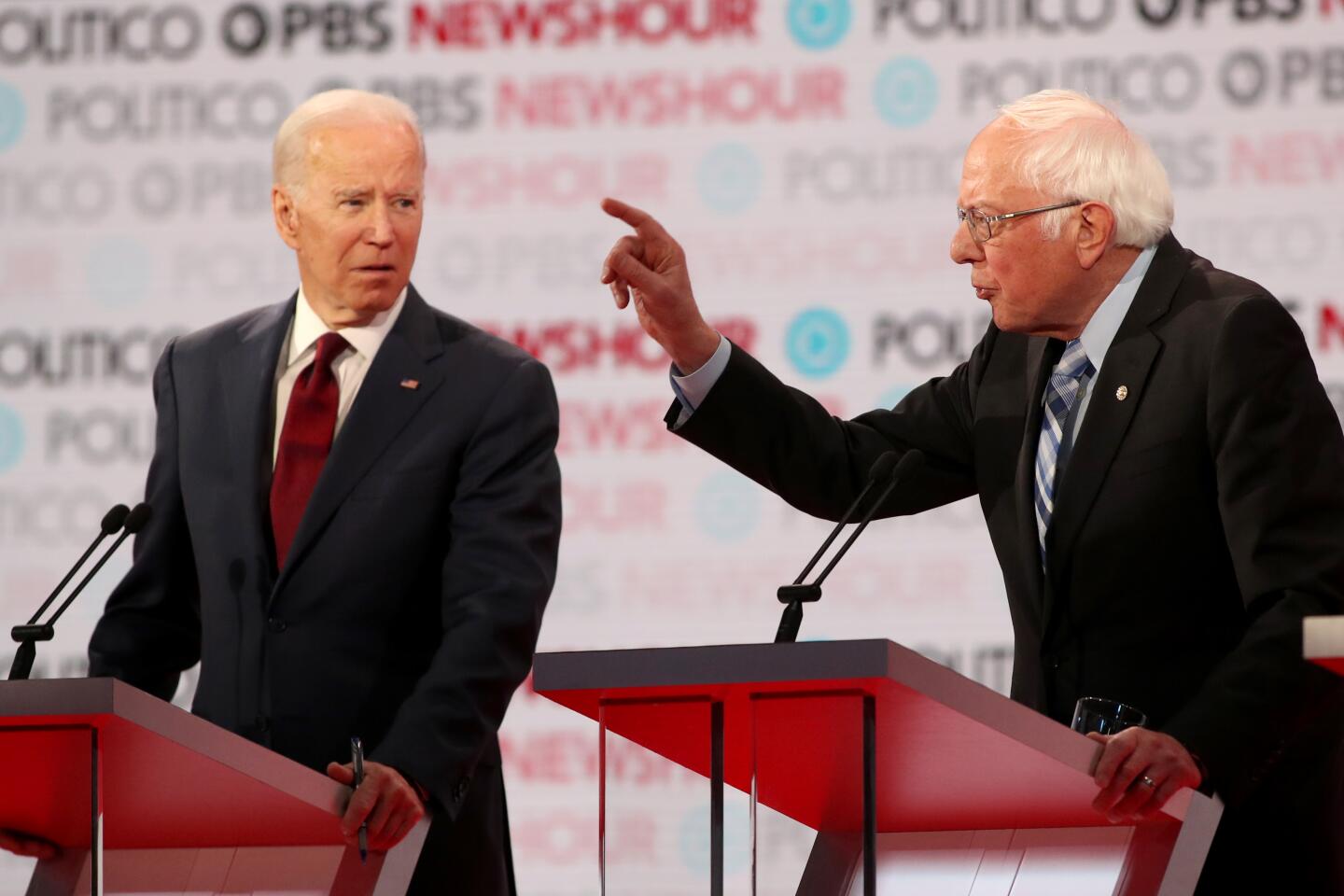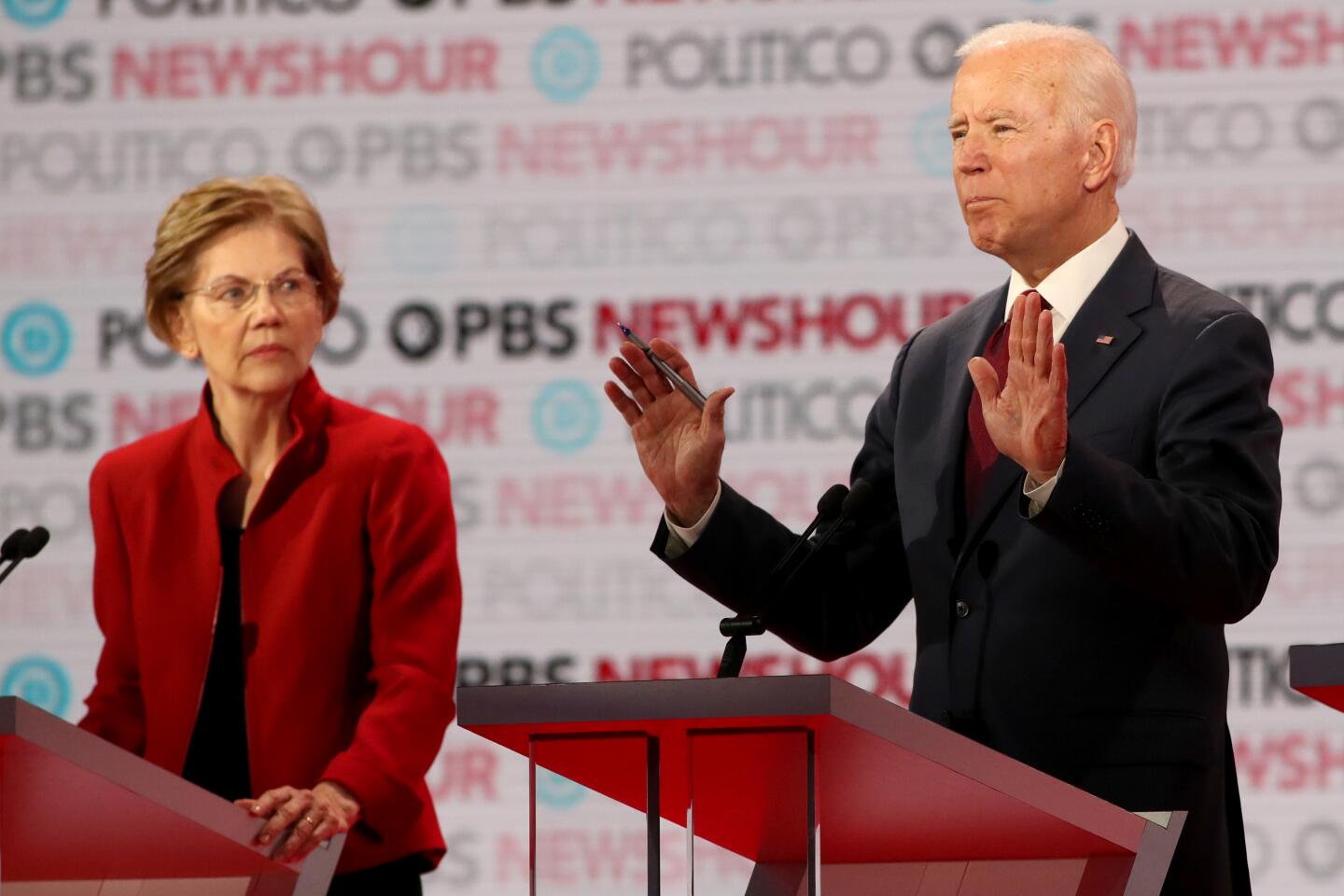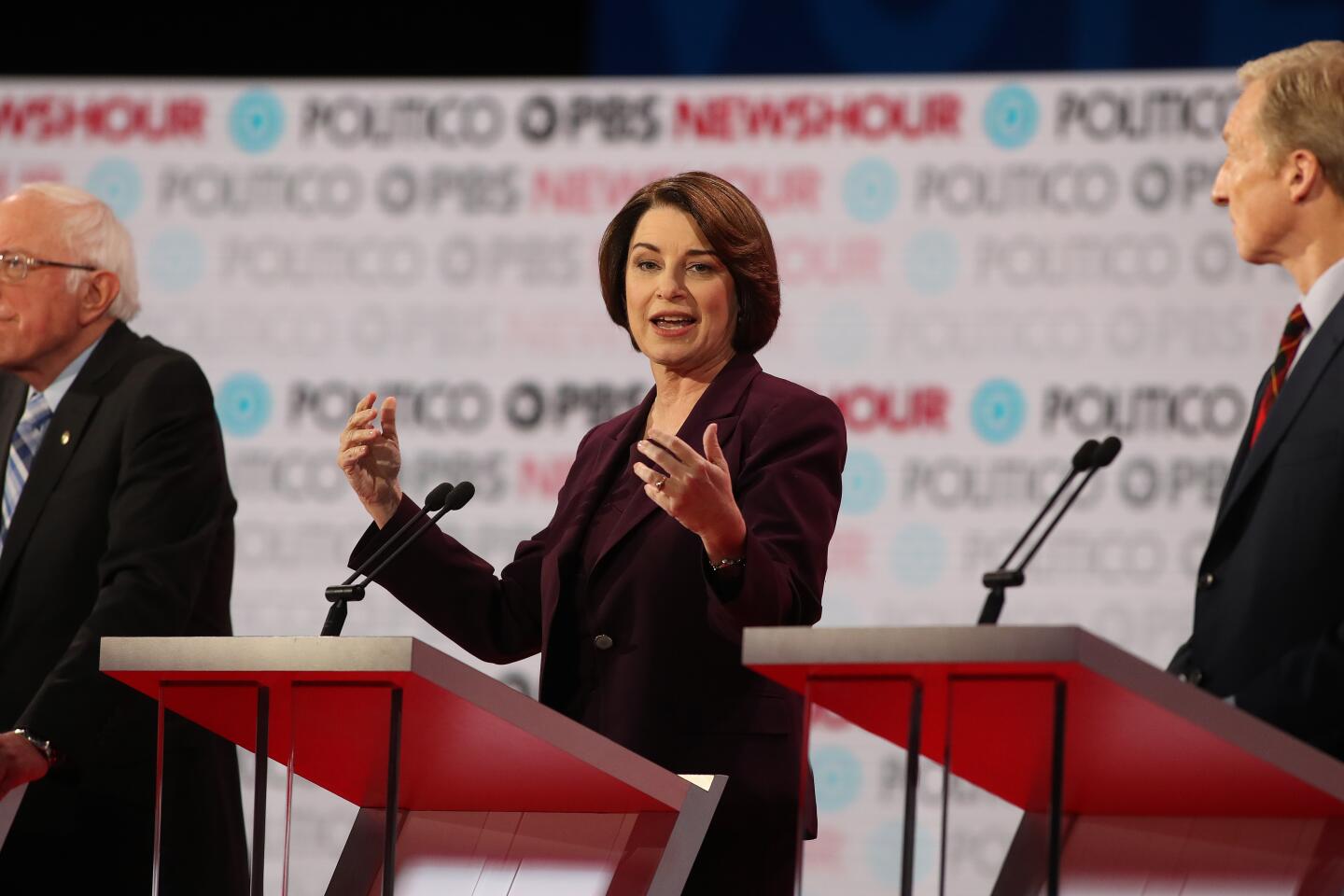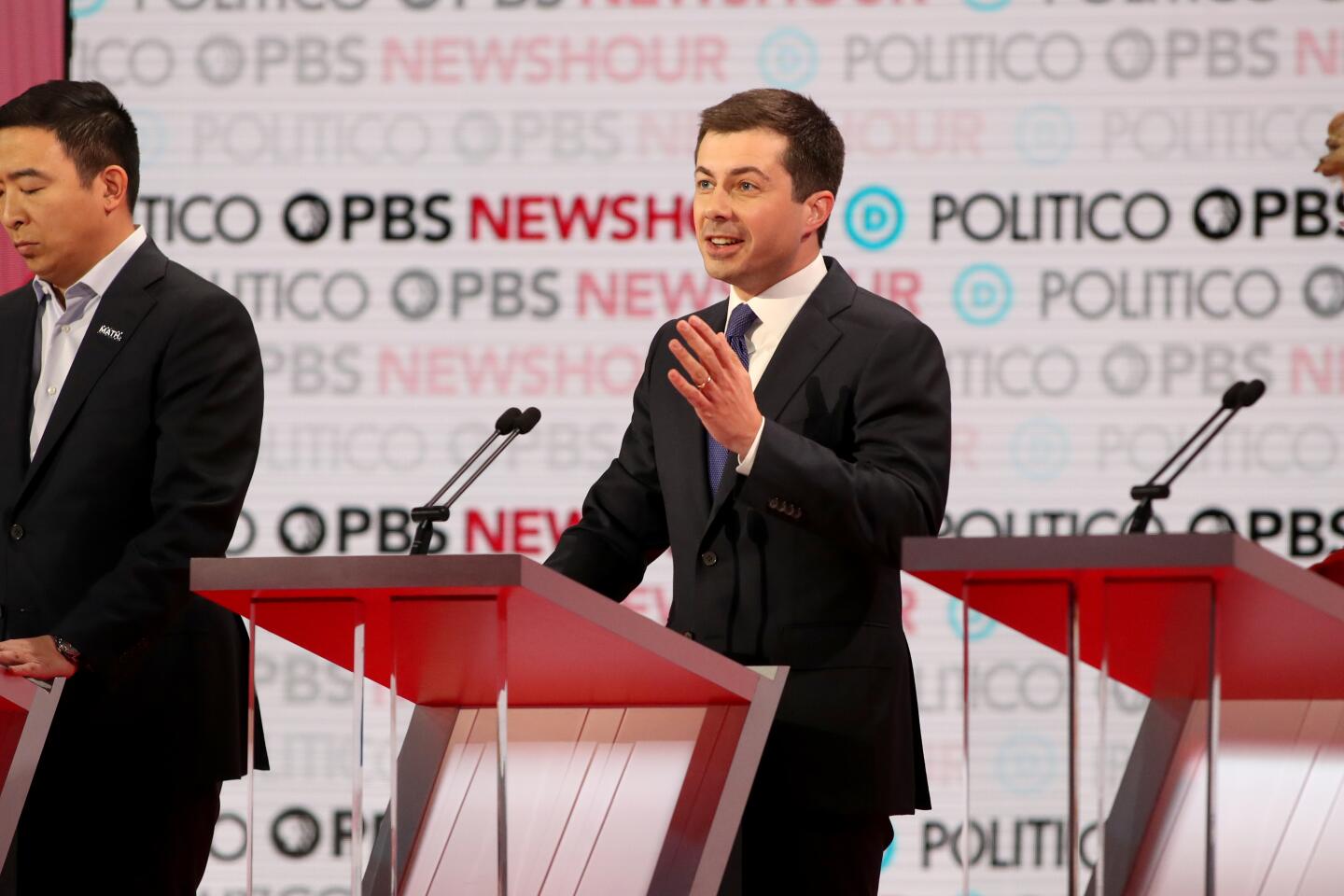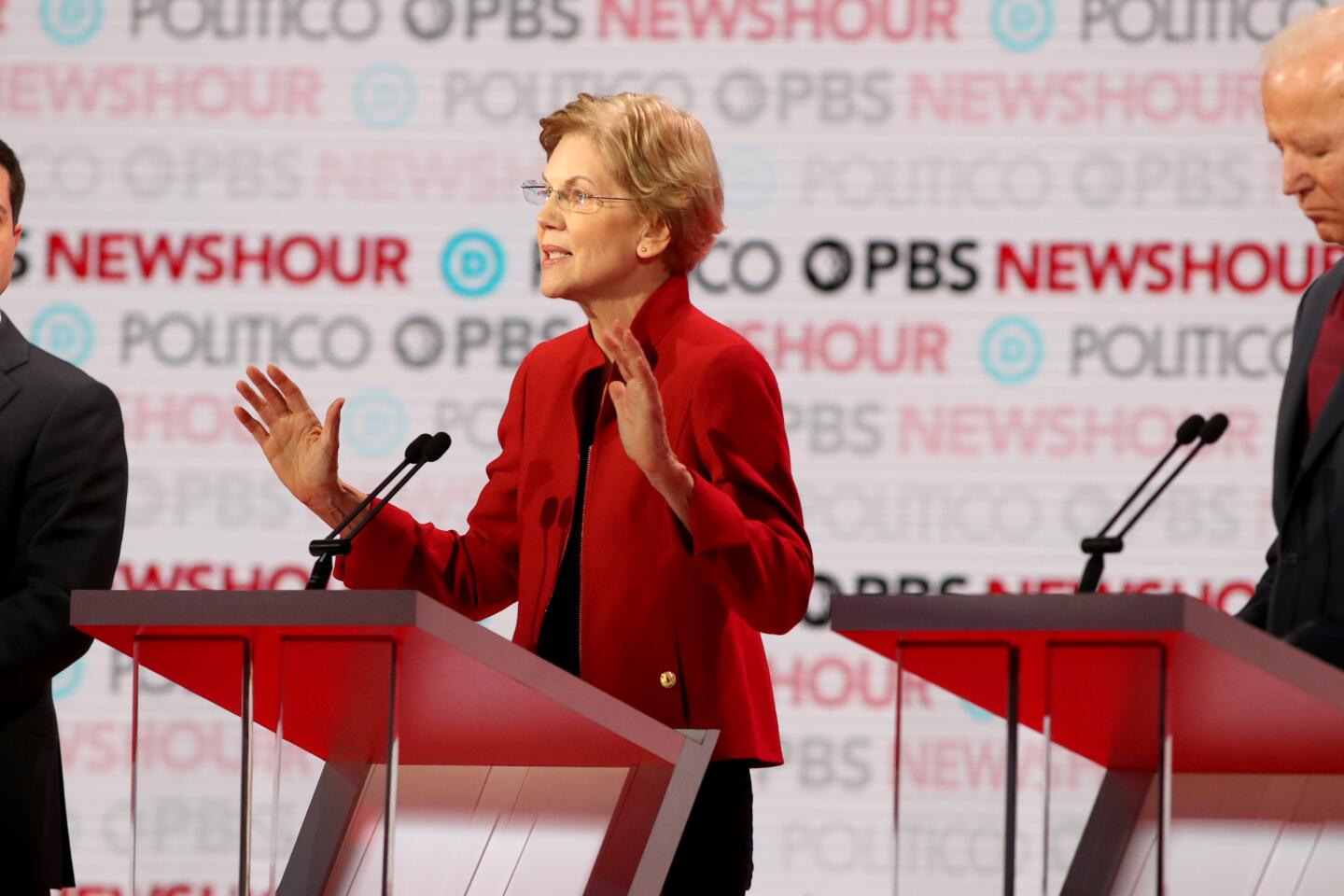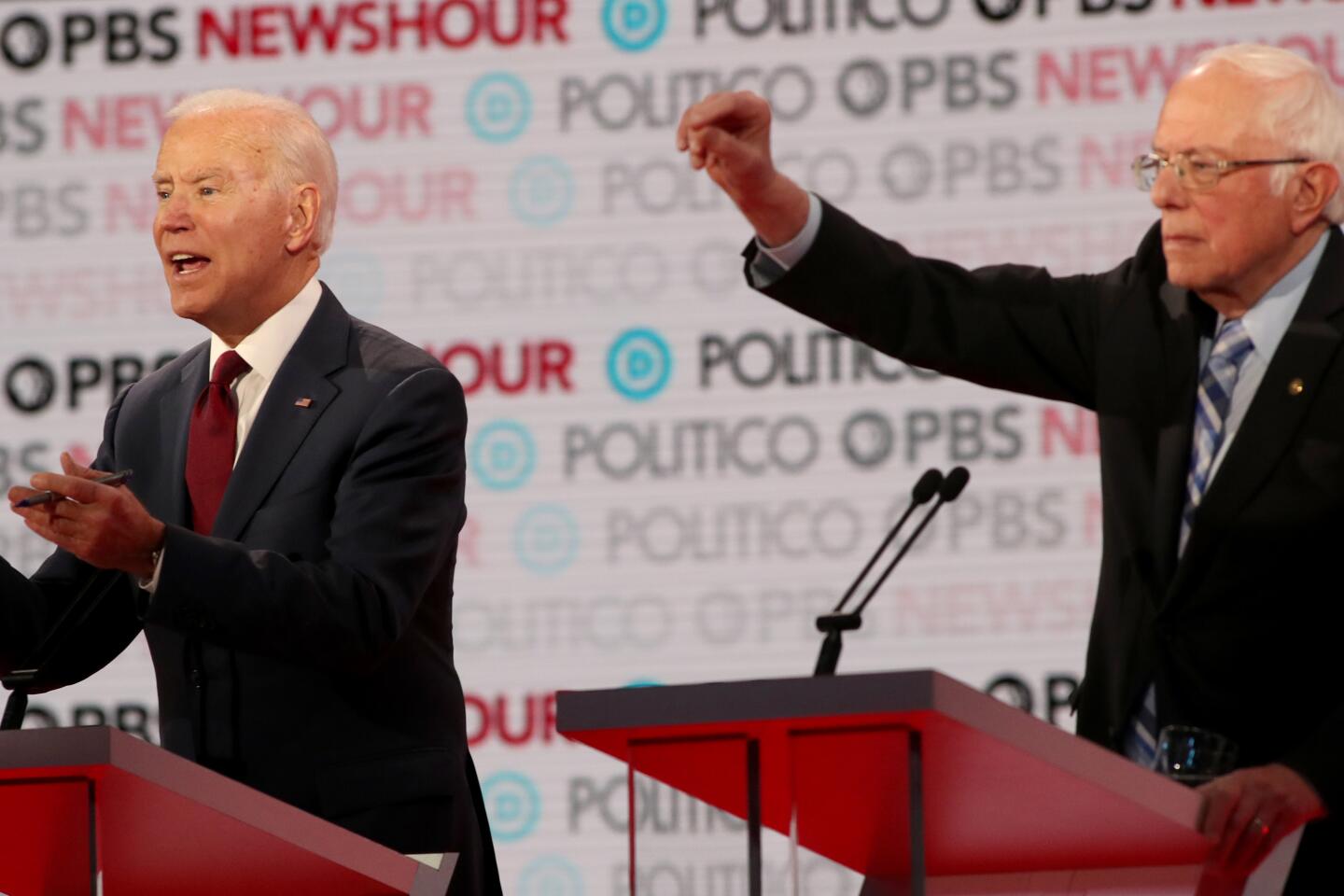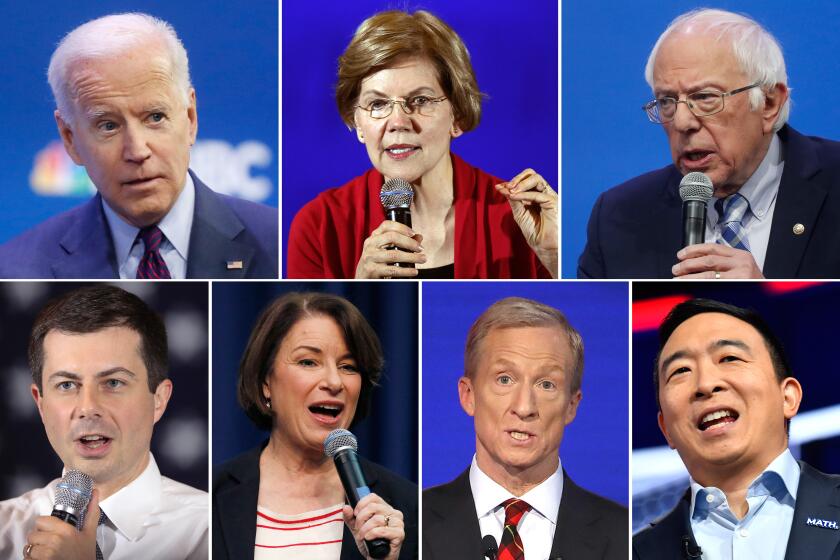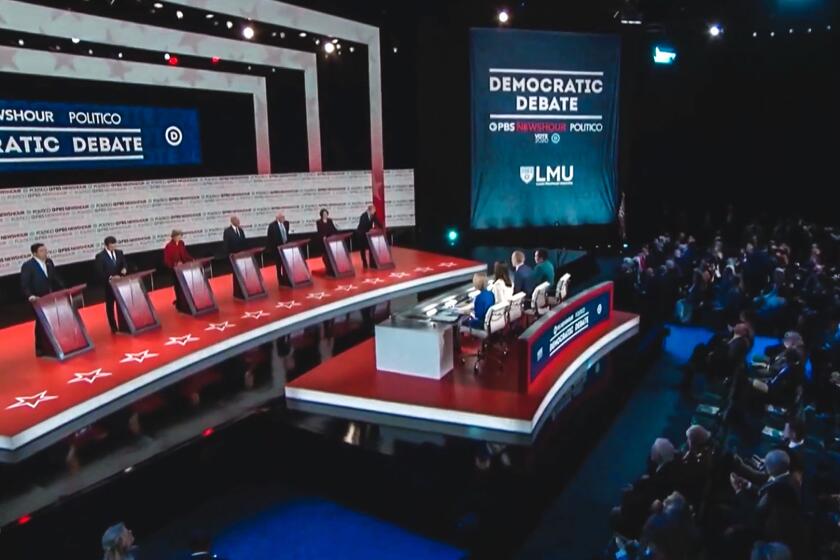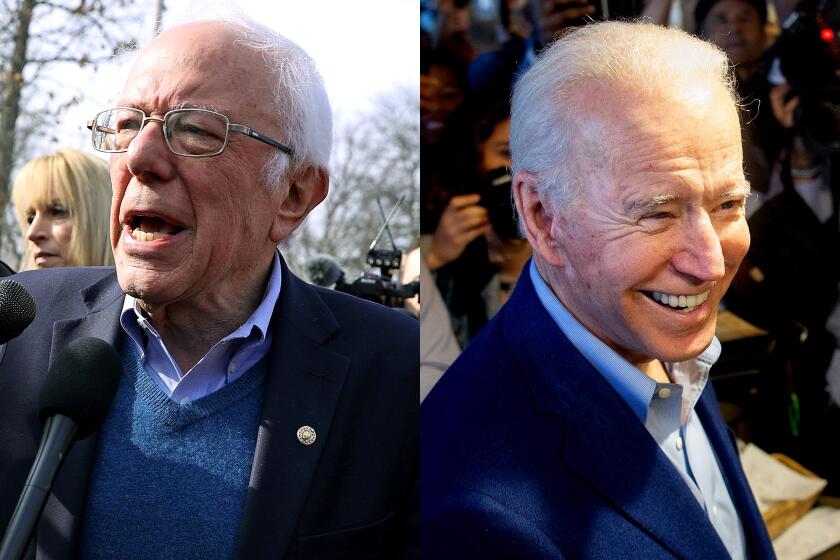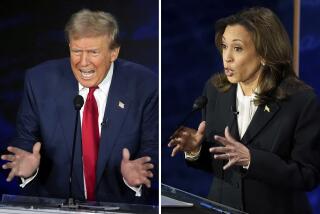At debate, Democrats argue over who can defeat Trump: A corruption fighter or coalition builder?
- Share via
WASHINGTON — With the shine off their impeachment vote and President Trump’s fate seemingly secure in the Senate’s hands, the leading Democratic candidates to unseat him turned with fresh urgency Thursday night to the question of who is best positioned to beat him at the ballot box next fall.
Voters’ preoccupation with the topic of “electability” seems to be intensifying as they get closer to casting ballots in the Democratic caucuses and primaries, which begin in Iowa on Feb. 3 and New Hampshire on Feb. 11.
A Gallup poll in November found that 60% of Democrats gave priority to a candidate who has the best chance of beating Trump rather than choosing one who agrees with them on issues, a sharp contrast with previous contests.
In Thursday’s debate, the candidates reflected that voter focus. An argument about what electability means ran through the debate. The candidates repeatedly emphasized disparate theories about what it will take to win in 2020: nominating an experienced politician or a Washington outsider, a strong progressive or a more moderate coalition-builder.
“Let’s talk about how we win an election, which is something everybody here wants to do,” said Sen. Bernie Sanders of Vermont, arguing that an inspirational progressive agenda was needed to drive turnout high enough to beat Trump.
“You have the largest voter turnout in the history of America. And you don’t have the largest voter turnout unless you create energy and excitement.”
Sen. Elizabeth Warren of Massachusetts, who largely shares that part of Sanders’ theory of the race, argued that an anti-corruption fighter like her is needed to provide clear contrast to Trump.
On the opposite side of the argument were the three more centrist candidates — former Vice President Joe Biden, Sen. Amy Klobuchar of Minnesota and Mayor Pete Buttigieg of South Bend, Ind. Although the three differed from one another, especially in the case of Klobuchar and Buttigieg, they shared a view that defeating Trump requires an emphasis on pragmatism over ideology.
Pete Buttigieg fends off attacks from Elizabeth Warren and Amy Klobuchar in the Democratic debate in Los Angeles. Joe Biden and Bernie Sanders train their sights on each other.
“We all have big progressive plans; the question is who can deliver on those plans,” Biden said. “Who has the best chance, the most likely chance, of defeating Donald Trump?”
The competing claims — and challenges to each other’s claims — to be the party’s standard-bearer helped produce one of the most animated debates so far among the big field of Democratic contenders.
Political partisans always want to defeat the other side, but Democratic voters have been singularly obsessed with beating Trump almost since his inauguration. Few held high hopes that he would be removed from office by the impeachment process, but the futility of that effort was brought home when the House vote Wednesday split almost exclusively along party lines and it became clear that Republicans would hold the line against Trump’s conviction in a Senate trial next year.
Though many polls show that electability is a primary concern for Democratic voters, they have had widely varying views about what that means in 2020. To some, it signifies a safe, cautious choice — a centrist like Biden who presumably can speak to swing voters.
Candidates in the December Democratic debate want to scrap Trump policies. But where do they differ on healthcare, immigration, climate, gun control and housing?
But progressives worry such a choice would kill off excitement within the party’s young, diverse, progressive base, which needs to be mobilized to win in 2020. Others fear that the whole concept of electability has become an excuse for defaulting to a white, male nominee.
Polls show that at least a sizable plurality of Democratic voters perceive Biden as the safest bet to beat Trump. That durable perception has contributed to his remaining the front-runner in national polls despite a series of campaign stumbles and uneven debates.
On Thursday, Biden delivered one of his better performances, with fewer garbled passages, a display of his command of foreign policy, and a defense of his claim — criticized by Warren and others as naive — that he would be able to work across the aisle with Republicans.
“If anyone has reason to be angry with the Republicans, and not want to cooperate, it’s me, the way that they have attacked me, my son, my family,” he said, alluding to Trump’s effort to get Ukraine to investigate Hunter Biden’s business dealings in that country.
Seven of the party’s White House hopefuls laid aside notions of peace on Earth and good will toward man — and woman — to joust in the year’s sixth and final presidential debate.
“I have no love” for the opposition, he continued. “But the fact is, we have to — we have to be able to get things done. And when we can’t convince them, we go out and beat them.”
He reiterated his core message that he is best qualified not just to beat Trump but to bring the country together in his wake, and he successfully parried a question about one of his biggest liabilities: his age.
“I’m running because I’ve been around. With my experience hopefully comes judgment, a little bit of wisdom,” he said.
Buttigieg, the 37-year-old mayor, repeatedly suggested — without mentioning Biden by name — that Washington experience had failed to address festering problems that gave rise to Trump’s election.
Building the case that a Washington outsider like him would stand a better chance of leading the party to victory, Buttigieg said, “We’ve got to break out of the Washington mind-set that measures the bigness of an idea by how many trillions of dollars it adds to the budget or the boldness of an idea by how many fellow Americans it can antagonize.”
Here are key dates and events on the the 2020 presidential election calendar, including dates of debates, caucuses, primaries and conventions.
That was also a swipe at Warren and Sanders for ambitious, costly proposals that Buttigieg has portrayed as unrealistic and politically risky, including “Medicare for all” and free college tuition.
Warren renewed her attacks on Buttigieg for wooing big donors in fancy settings, such as a California wine cave this week, and argued that her anti-corruption platform and grass-roots fundraising base made for a strong contrast with Trump.
“We need a candidate for president who can draw the sharpest distinction between the corruption of the Trump administration and a Democrat who is willing to get out and fight, not for the wealthy and well-connected but to fight for everyone else,” she said.
Buttigieg, responding to Warren’s attack, returned to the electability theme, saying she was underestimating what it would take to confront Trump’s massive campaign war chest.
“This is our only chance to defeat Donald Trump,” he said. “And we shouldn’t try to do it with one hand tied behind our back.”
The candidate who made the bluntest — and most persistent — argument about electability was Klobuchar, for whom the debate could be her last, best platform for lifting her campaign from its lower-tier status.
“We should have someone heading up this ticket that has actually won and been able to show they can gather the support that you talk about with moderate Republicans and independents, as well as a fired-up Democratic base, and not just done it once,” she said.
The senator struck a middle ground in the skirmishing among the candidates, attacking Buttigieg for denigrating his rivals’ experience while questioning the political wisdom of Sanders’ and Warren’s progressive agendas.
She repeatedly emphasized her Midwestern background, insisting that her electoral success in Minnesota shows that she can win in other battleground states.
“It’s not flyover country to me,” she said. “I live there.”
“It is so important to pick the right candidate,” she added. “This primary comes down to some simple questions: Who has the best ideas, the best experience? And mostly, who can beat Donald Trump and how will she do it?”
More to Read
Get the L.A. Times Politics newsletter
Deeply reported insights into legislation, politics and policy from Sacramento, Washington and beyond. In your inbox twice per week.
You may occasionally receive promotional content from the Los Angeles Times.
